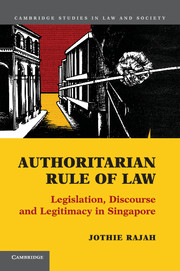Book contents
- Frontmatter
- Contents
- An Insider’s Preface on ‘Rule of Law’ Confusions
- Acknowledgements
- 1 Law, Illiberalism and the Singapore Case
- 2 Law as Discourse
- 3 Punishing Bodies, Securing the Nation
- 4 Policing the Press
- 5 Policing Lawyers, Constraining Citizenship
- 6 Policing Religion
- 7 Entrenching Illiberalism
- 8 Legislation, Illiberalism and Legitimacy
- Bibliography
- Index
- References
5 - Policing Lawyers, Constraining Citizenship
Legal Profession (Amendment) Act, 1986
Published online by Cambridge University Press: 05 June 2012
- Frontmatter
- Contents
- An Insider’s Preface on ‘Rule of Law’ Confusions
- Acknowledgements
- 1 Law, Illiberalism and the Singapore Case
- 2 Law as Discourse
- 3 Punishing Bodies, Securing the Nation
- 4 Policing the Press
- 5 Policing Lawyers, Constraining Citizenship
- 6 Policing Religion
- 7 Entrenching Illiberalism
- 8 Legislation, Illiberalism and Legitimacy
- Bibliography
- Index
- References
Summary
This chapter presents the third case study of this project: the 1986 amendments to the Legal Profession Act (LPA). Together with the study of the Religious Harmony Act (Chapter 6), the analysis of the Public Order Act (Chapter 7) and the discussion of the ‘foreign press’ amendment to the Press Act (Chapter 4), this case study demonstrates how, after achieving a spectacular level of economic prosperity, as well as social and political stability, the state clung to the construct of the perpetually vulnerable ‘nation’ when enacting ‘laws’ designed to constrain citizenship and civil society.
A liberal concept of citizenship and the capacity for civil society to counter the state are major constituents of political liberalism, a mode of ‘politics’ which, in turn, informs the ‘rule of law’. The studies of the Vandalism Act and the Press Act are part of a larger picture of how, by the late 1970s, opposition parties, trade unions, civil society and the press had been silenced, emasculated or co-opted. The PAP had consolidated its rule in such a way that the state was inextricably an extension of the party. If the voices targeted by the Vandalism Act and the Press Act belonged to working-class, ‘Chinese’-educated sections of the population who supported the opposition Barisan, then the voices targeted by the LPA, the Religious Harmony Act, and the Public Order Act might be seen as directed at a more middle-class, ‘English’-educated section of the population that was beginning to ask the state to honour the promised liberalism of ‘nation’.
- Type
- Chapter
- Information
- Authoritarian Rule of LawLegislation, Discourse and Legitimacy in Singapore, pp. 161 - 218Publisher: Cambridge University PressPrint publication year: 2012



